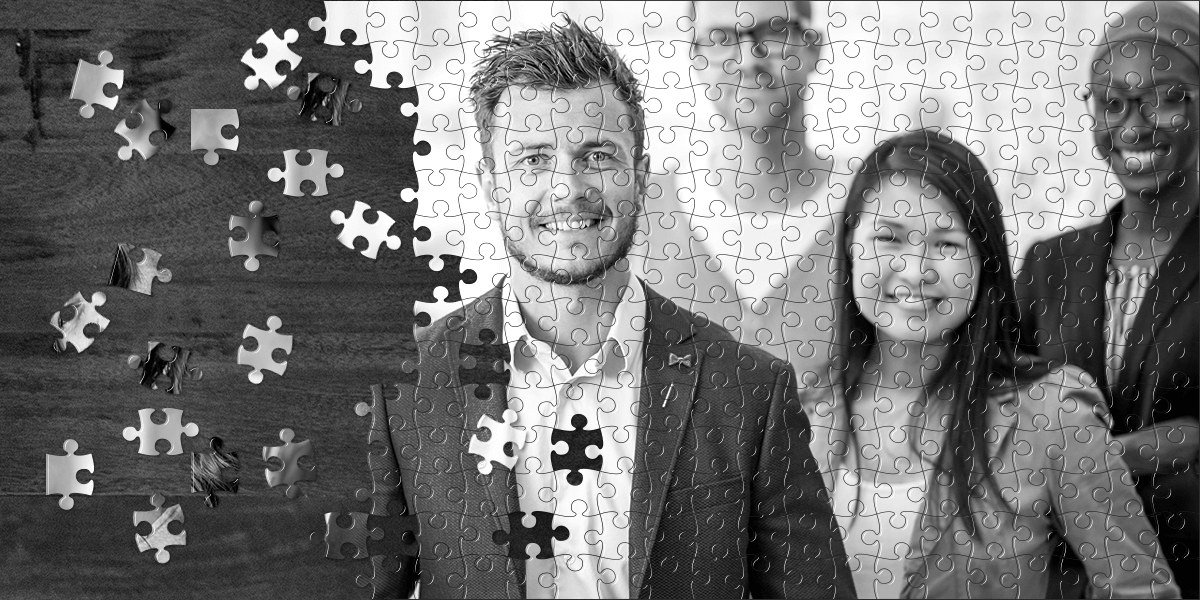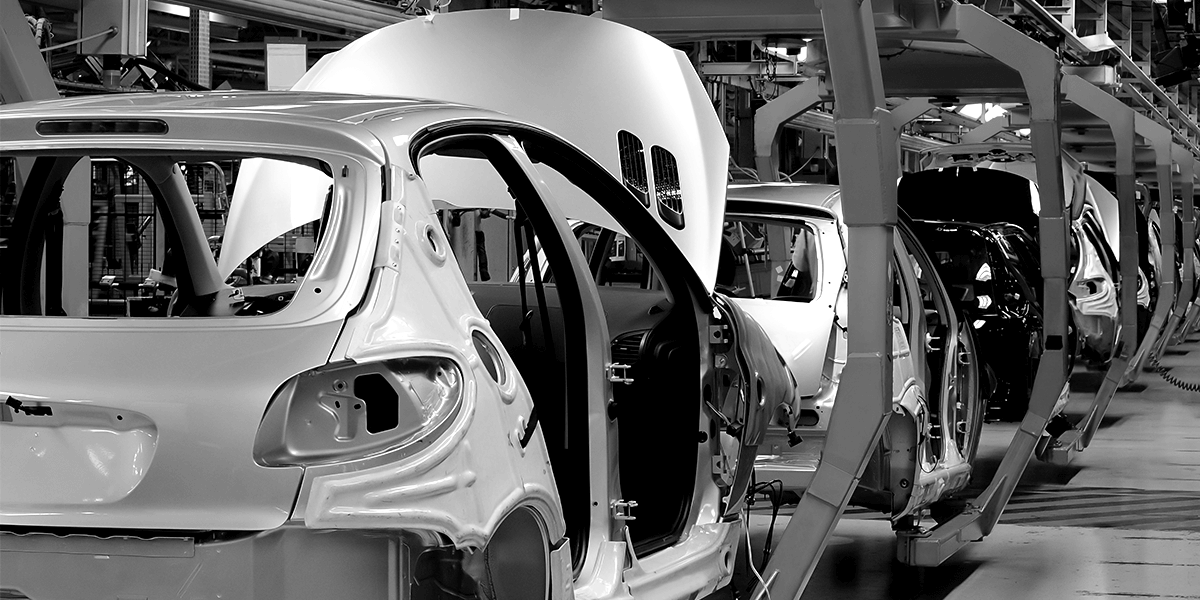Customer
Congruent Story brings culture-first thinking to auto industry
Paul Daly, the founder and CEO of Congruent Story, a brand marketing agency in Syracuse, NY, says brand-first thinking is the critical differentiator between companies that win and those that don’t. What does he mean? Keep reading or listen to the podcast.
A serial entrepreneur who leads with culture first, Paul Daly launched Congruent Story five years ago as an internal communications media unit for his auto repair and reconditioning company (Image Auto). With Congruent Story, or Congruent, Paul wanted to keep his team—which spread across 500 miles—aligned under a unified vision as they reached out to and serviced car dealerships. His customers, auto dealers, were so impressed with the branding and content that they asked Congruent to produce marketing strategy and materials for them. Soon, Congruent Story became a business in its own right, serving companies in the auto industry. Today, Congruent works with local and national companies across industries to help them build brands, create compelling content, and foster lifelong customer relationships.
Recently, Insightly CMO Tony Kavanagh checked in with Paul on Insightly Gamechangers Podcast. They spoke about the auto industry, brand-first marketing, how Congruent Story uses Insightly CRM, and more. Listen to their fascinating conversation on the podcast or continue reading to learn more. Please note that the interview below has been edited for readability, length, and clarity.
Listen to the full podcast on iTunes or SoundCloud.
What is the state of the auto industry? What are auto industry trends?
Tony Kavanagh: So there’s a lot of disruption in the auto industry. Elon Musk recently talked about Ford going bankrupt when we hit the next recession. The auto industry touches everybody in their everyday lives and has such a huge influence over us. I’d love to get your perspective on where it’s going.
Paul Daly: Look, at the base of automotive, or aviation, or public transportation, mobility is the real currency. Getting from point A to point B, and that’s nothing new. Mobility has been a type of currency and a staple for centuries. The auto industry has been quintessential America for the last hundred years. The automobile has been our ticket to mobility. It’s become a part of our culture, our lives, and what we rely on.
In this technological age, not only the mobility scene has begun to change because we’re in a car, but also because of the availability of that car now with Uber and Lyft and autonomous vehicles. It’s just a lot of fun and there’s a lot of hype around these new technologies.
Elon Musk has become such a voice in the industry because he’s disrupting the sales model—how we manufacture and get to the customers. I think when most people think of the automotive industry, they think of a car dealer because that’s where we purchase cars, historically.
[Auto industry] has been a staple of our economy for years. Prior to the 2008 recession, the saying was, “Whatever’s good for General Motors is good for America.” That changed in 2008 when GM went under. Then, we realized that one company and our economy weren’t so closely tied together, because we found another way.
But the auto dealer model is how we have traded vehicles, and that’s been legislated. It goes back to World War I. When Henry Ford was making cars in America, the government and the people saw that the more Ford succeeded, the more Americans had these vehicles and [the business] would develop faster.
So, it was conducive to distribute these vehicles faster, which meant, building a franchise model so that they could sell through franchise dealers. Then, the legislation came in place to protect those dealers, so that they could build a business around selling a certain product. Here we are, a hundred years later, and we have deep legislation to protect auto dealers from direct to consumer sales model, which Elon Musk is disrupting. There’s a lot of fighting over that.
Another component is the availability of information. In the sense that, the way I buy a car now has changed. I don’t walk into dealerships and see what they have, and pick something that they have. I go online, do my car shopping, and I know every dealer that has every car that I like. If I like a 2017 Camry, I can now see where all the 2017 Camrys are in my market and their price. That’s historically called an efficient market—where the buyer and the seller have the same information. We are there now, and that’s a huge disruption.

How are car dealerships adjusting to new consumer behavior and trends?
Tony: You talk about Fordism, which is the foundation of what we know as production lines today. Of course, they’ve been improved over the years; robotics and so on have influenced how cars get made, so radical changes are always happening there from a technology perspective. But also, the dealership model, as you say. Anything that’s in a protected environment is bound to be disrupted at some stage.
How do you see the dealership model working in the future? Because, it is changing, right? The experience that we expect as consumers is also changing with the whole move to a subscription-based model for purchasing of goods and services.
Paul: I have to start off by saying I owe quite a bit to the dealership model. A number of Congruent Story’s clients are dealerships. I will also say that that doesn’t mean anything when it comes to what the consumer thinks about it. It’s the consumer who’s going to decide.
My message to dealers that are hanging their hat on franchise law I say, “You know that laws are decided by legislators, and legislators are voted in by people. If people want something enough, they’re gonna get it.”
So, I agree with you—eventually, these types of things are disrupted and I don’t know how and when that’s going to happen. It’s already being shaken up quite a bit. But I also, to your other point, believe that the consumer experience has now risen to the top of the pile when it comes to what you need to deliver as an auto dealer.
You need to deliver a transparent experience. We have a bad reputation in the auto dealership world of being dishonest, always trying to get a little bit more out of the customer. There’s just not a lot of trust built there.
Now, I see a lot of progressive dealers, and the savvy ones, and the ones who are disproportionately going to win, they’re the ones that are empathetically addressing that issue head on. They’re not trying to hide from it. They’re not trying to say, “Well, that’s not us, that’s the dealer down the street.” They’re saying, “Hey, we understand you feel this way. Frankly, this industry has earned it.”
I believe that the dealers who are paying attention can and should deliver the very best customer experience and are capable of it because they’re in the communities. Many of these are family businesses who have been staples of the community and have given usually more money, and time, and volunteer work than the next 10 businesses in any community.
I still believe that the local dealership model, the franchise dealership model, has a lot of life in it if they pay attention. There are enough that are paying attention, but they’re just going to disproportionately crush the other guys. Their acquisitions are going to increase. It’s just going to be a more consolidated market. So, I guess that’s my 30 thousand foot on the industry for the next 10 years.

Considering the changes in the auto industry and consumer expectations, what is Congruent Story focused on?
Paul: We’re a brand-first creative agency. There’s a big problem with communication—from one person to another, or an organization to a group of people. It’s a problem that will never be fully solved. I don’t think it will ever be solved by AI.
We can have algorithms and marketing AI bots. We can solve a lot of problems. But I really believe that some of the things that they solve are just tactics. They’re important tactics, but I think below all of that, the empathetic communication from one human to another by one purpose, communicating someone else’s purpose—that’s what I think about most.
At Congruent we’re going to continue to think brand first, because it’s going to be the critical aspect of differentiator between the companies that win and the companies that don’t: sharpening that brand message and then executing to that. So I think there’s a lot of white space there and I don’t think that space is ever going away.
What does it mean to be a brand-first company? How do you become one?
Tony: It’s so interesting. Here at Insightly, we are so maniacally focused on trying to deliver a tailored or a very personal message and experience to customers that we put a lot of time and effort in figuring out our customers’ needs and how to satisfy them and deliver a tailored message—that’s what they expect and that’s what they should get.
To your point, AI and technology take away the drudgery, the blocking and tackling, and the basics we’re addressing. But you can’t replace an individual’s or human being’s ability to resonate with another. I think the more we can do that on a more personalized basis, the better.
Paul: What you’re saying about empathy, the ability to connect and being focused on that—I’m sure in your business, just like in mine, it’s the same principle. Having a clear message actually helps you recruit and align a great team. Because, like the communication aspect of it, it goes both ways. It’s hard enough to communicate with customers, try aligning a team behind it. If your messaging isn’t sharp and your vision isn’t sharp, it makes that task twice as hard.
Tony: We tend to take a lot of pride in hiring the right people. You’re a culture-first guy. We are the same way, it is all about the people and the culture. It speaks volumes. When we write our brand guidelines, we talk about the culture and who are we.
The brand is everything we do. It’s who we are, it’s how we behave, it’s what we say in the market. It’s how we treat our customers, it’s everything.
It’s sort of cool to think that really the future success of any business is to be able to treat every customer like they’re your only customer, even if you have thousands of them.
Paul: That can only ever happen if you have a brand understanding within your own walls. You can never do that unless you do the hard work of what you’re doing.
People will say, “Hey, your brand is not your logo, your brand is not fonts, your brand is not a sign. It is not a mission statement. Your brand is a feeling. It’s how people feel when they hear your name, when they interact with one of your people, when they log onto the app and they see the Insightly logo. It makes people feel a certain way.”
One of my favorite brand definitions is from Shep Gordon: [A brand] is a set of expectations, and memories, and relationships that, when you add them all together, basically, account to a customer’s decision whether to do business with you or someone else.
So, I love that Insightly is working on that. You know, it’s funny, it shows in my experience with Insightly and my interactions, I know that there’s a focus there. I could just tell that when I’m doing business with a company that has a level of unified beliefs. So, it’s cool to hear some of the backstory.

How does Congruent team use and benefit from Insightly?
Paul: I have a team, it’s several people who use Insightly at the same time. I’m more of a beneficiary of the rest of my team using it because I don’t personally interface with it that much anymore. But the part that means the most to me, which I use often, is the pipeline feature and the way we can track our sales pipeline. I make business decisions based on that all the time.
For example, my business director and I go through leads and how far along they are. We’re able to set up a flow that works for us and close probabilities that work for us. We’ve gotten it dialed in really well now. So it’s part of my weekly review with my business director.
But when it comes to hiring more people, or potentially considering new space or equipment purchases, that pipeline has become a tool that I use to inform those decisions on a weekly basis. So, to that note, that’s what means the most to me and is the most effective component in my decision-making process at this point in our business.
Tony: It’s great to have all data around your customers and your potential customers in one place. There’s millions of data points that you can look at and start to build a picture that’s much more higher definition than anything you’ve ever done before. So, having all of that data in one place is very important.
[At Insightly] we truly believe that it’s all about customer information and to be able to service the customer exactly the way they expect at every touchpoint in the buyer cycle. So the more information you can surface to people, who are servicing the customer over time, the better. So the more informed your salespeople are, your service people are, or your delivery people are about the customer and their preferences, the better that delivery quality will be or the better that sales experience will be.
Being able to surface that in a way that’s easily consumable is tantamount for us as we move forward as a company. But also, for our customers for their success in the future. So, it’s really cool stuff that we’re working on here in the background. You’ll see a lot of new stuff coming out over the next coming quarters and years.
Paul: Wow, that sounds really interesting. I don’t know what you’re cooking, but it sounds like it’s gonna be really interesting.
Tony: Paul, it’s been a real pleasure. Thank you for taking the time today. But also, thank you for being a great customer of ours. We’re delighted to help you on your way.
Paul: It’s been a pleasure being an Insightly customer and to talk to you today.
Want to learn about other Insightly customers who are changing the game in their industries and making a difference in people’s lives? Check out Insightly Gamechangers Podcast on iTunes or SoundCloud.
Prefer to read the stories on the blog? Here are the links:
- Authentically yours, Candice Simons
- What is the future of work? A conversation with Hot Spots Movement
- Connecting people to care with Insightly CRM + Office 365
For more customer stories and use cases, please browse Insightly Customer Stories.
